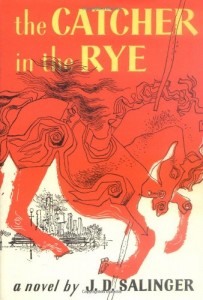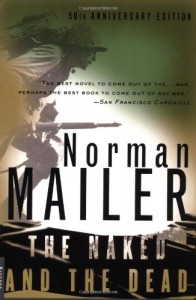I have received a review on Amazon for I Stopped Time which I’m not sure I quite deserve: “What I like about her (Jane’s) books is that there is no bad or offensive language – something that you cannot say about a lot of books these days.”
This raises an uncomfortable question: should writers allow their characters to swear? My answer would quite simply be, yes – in fact they must, if their writing is to be honest and authentic. As a fellow writer recently blogged: “I work in a factory, and if I was going to depict life in the factory, I couldn’t do it without throwing in some foul language. In all honesty, it actually makes me a bit uncomfortable to hear how some of the guys talk sometimes – but my views of decency and propriety don’t change the way the world actually is.”
To some, to permanency of the written word means that swearing in print has higher shock value than the spoken word. Norman Mailer’s American publisher was so concerned about his use of the F-word in his World War II novel, The Naked and the Dead, that they replaced it with ‘fug’. Three years later, J D Salinger became the first author to have a novel published with the F-word left intact. Even today, The Catcher in the Rye remains one of America’s most banned books.
We are more familiar with sound of the F-Word. In 1963, Kenneth Peacock Tynan, literary manager for the National Theatre Company briefly became the most notorious man in the country by using it on British television, a move referred to as a ‘masterpiece of calculated self-publicity’. Mary Whitehouse only added to the equation when she wrote to the Queen demanding that he should have ‘his bottom spanked’. How times have changed, Gordon Ramsey (and you, a father of four). This anomaly appears to remain. The opening scene of Four Weddings and a Funeral, consisting almost entirely of the F-Word, manages to remain inoffensive, but I need to be in the right frame of mind to stomach Vernon God Little.
Is it possible to create authentic characters while avoiding offence? Ronnie Barker managed it when he introduced the word ‘Nark’ in his 1973 prison-based comedy-drama, Porridge, and and gained an enviable family-based audience of 15 million. And Cee Lo Green produced a radio edit of Fuck You, but, frankly, Forget You doesn’t hit the spot for me.

I accept that over-use can diminish the impact of good old Anglo Saxon language. In Rachel Joyce’s The Unlikely Pilgrimage of Harold Fry, the first swear word appears on page 148. It retains full shock-value, coming as it does from Harold’s damning self-assessment of his failings as a father. In fact, it triggered a real emotional response in me. Joyce follows this up by introducing a truly good character called Martina whose language, in my mother’s often-used phrase, ‘leaves much to be desired’. But not knowing her, the reader may start to judge before realising the kindness in Martina’s intentions.
Not all readers, it seems, can distinguish, between the views of the writer and the views of their characters. Stephen King offers this comfort: “Not a week goes by that I don’t receive at least one pissed-off letter (most weeks there are more) accusing me of being foul-mouthed, bigoted, homophobic, murderous, frivolous, or down-right psychopathic.”
And so I continue to allow my characters to swear, when the situation demands it. But not Sir James Hastings who will always, for me, remain an English gentleman. But nineteen-year old Jenny Jones? I allow her to swear – to grab his attention.
“Your trouble is you’re judging him by today’s standards. It was extremely unusual for a man to raise a child by himself in those days. I was lucky not to have been farmed out to spinster aunts.”
“And your trouble is that you’ve never given a moment’s thought to your mother’s point of view!”
“I beg your -”
“You worshipped your father, while she was always the villain!”
“What do you know about it?” I exploded, red-faced, but Jenny was undeterred.
“Quite a lot, actually. All of this!” Placing a small pile of photographs on the table, she deliberately sent them spinning in all directions. Her hands at shoulder level, she looked about the room at the growing piles of debris we had created, while the boxes in the hallway still appeared as mountainous as ever. “I don’t know what you see when you look at your mother’s work, but I’ve been looking at the world through her eyes! Have you even noticed what she chose to photograph when she wasn’t working in her studio?”
“I, er -”
She looked at me while I stammered, unable to lift my eyes from the table. “Middle aged women and young boys! Mothers and sons: everything she didn’t have.”
“Perhaps they made interesting subjects -”
“I’ve tracked the dates on the backs. First we have the women – or perhaps I should say ‘the mothers.’” She snapped a number of photographs face down on the table in front of me, the dates clearly written, not within the official stamp of the Parker’s studio, but in plain blue ink. “Then we have a gap of several years. But when we come back, the subjects change: boys this time. 1927. 1928. 1929. And here. 1930. Look at them! See how they’re getting older?” Impossible to argue, I nodded feebly. “I’m willing to bet they’re almost the same age you would have been. Your mother spent the first part of her life looking for the mother she never knew. Then she spent the second part of her life looking for the son she never knew. I wouldn’t call that the actions of someone who didn’t give a shit. Would you?”

March 2015… an update
Mild though it may seem, an s-word still has the power to offend. The Clean Reader app, designed to cleanse text of swear-words and reference to body parts, caused outcry from authors on its launch. Joanne Harris went as far as saying that it was potentially illegal. Among those to protest was Margaret Atwood who tweeted, “Could you take the kettledrums out of Beethoven because you don’t like loud noises and still call it Beethoven?” Read the full article here.


